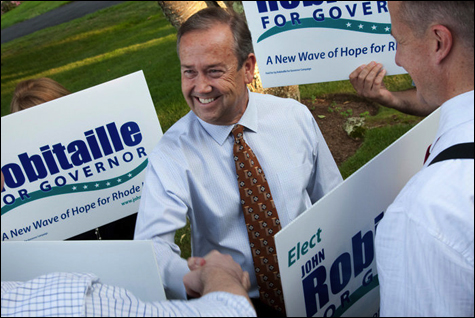
THE ALMOST-GOVERNOR Robitaille flew under the radar. |
The headlines from this year's gubernatorial race were Democrat Frank Caprio's indelicate suggestion that the leader of the free world "shove it" and Lincoln Chafee's historic victory as Rhode Island's first independent governor.
But the most stunning and underreported story of the race — of the entire year in politics, for that matter — was the near victory of Republican John Robitaille, who finished just two points short of Chafee on Election Day, 36 to 34 percent.
Think of it: Rhode Island, staring down its worst economic crisis in a generation, came within a few thousand votes of handing the corner office to a largely unvetted public relations specialist with no experience in elected office.
How did Robitaille, virtually ignored until the final weeks of the campaign, get so close? How was everyone caught so off guard?
And what does the opaque picture of the almost-governor tell us about the state of Rhode Island's newspaper of record?
THE AFTERTHOUGHT
In late 2009 and early 2010, all the buzz on the GOP side centered around Steve Laffey, the combative and quotable former mayor of Cranston.
And when Laffey pulled up his tent with a typical rhetorical flourish — declaring that the state was not ready for the strong medicine he would prescribe — Robitaille's official entry to the race had the feel of an afterthought.
Here was a guy who no one had heard of, who had no personal fortune, who would be no factor. He made a weak showing in the early polls. Fundraising was a struggle. And the media — the Phoenix included — gave the candidate little ink.
Robitaille, a communications specialist, says he was unsurprised by the lack of "free" or "earned" media — as opposed to paid ads — at the outset. "I knew that earned media — you had to earn it," he says.
But Giovanni Cicione, chairman of the state Republican Party, allows for a bit more disappointment, calling the Providence Journal's early inattention "shortsighted" and "wrong."
From his perspective, the seeds of a competitive bid were always there. A GOP candidate running for major office, he says, is virtually guaranteed 28 to 32 percent of the vote — no small sum in a multi-candidate race. And a national swell of anti-incumbent, anti-Democratic feeling seemed bound to add a few points to the total.
Indeed, as one Democratic operative notes, there is an argument to be made that Robitaille was the only of the three major candidates with a natural base: Chafee, the independent, was running outside the party structure and Caprio's explicit bid for conservative support seemed destined to alienate the progressives and labor interests who form the backbone of the Democratic Party.
But there was little opportunity to alter the dynamic in the early months of the campaign. With no competitive GOP primary for governor, the press was destined to keep its distance. And because Rhode Island stages its primaries so late — in September — Robitaille had to wait months before he could get access to the public campaign funds that would allow him to pay for an advertising campaign of any significance.